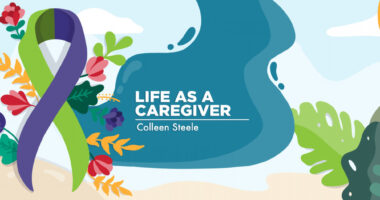‘I Think I Can,’ Said the Little Caregiver That Could

I’m an avid reader who, at 50, still considers “The Little Engine That Could” to be one of my favorite books. This timeless, inspirational story and its catchphrase, “I think I can,” date back to a Swedish version in 1902.
As an adult, I had the pleasure of reading the same edition that I enjoyed as a child, written by Watty Piper and illustrated by Ruth Sanderson, to my own children.
The story begins with a happy train carrying special treats and toys to children on the other side of a mountain. When its engine breaks down, its rescuer is not a shiny, new passenger engine, a big strong freight engine, or a rusty old engine, but a tiny blue engine. Slow but steady, that engine pulls the train up and over the mountain while chugging, “I think I can — I think I can — I think I can …” and puffs, “I thought I could — I thought I could — I thought I could …” on her way back down.
“The Little Engine That Could” encourages kindness, optimism, and hard work, which are values that people of all ages can use a boost to maintain.
Throughout life, the signature phrase “I think I can” has pulled me through many uphill battles and helped me carry my son Cullen through very steep ones.
Cullen was 8 when diagnosed with pulmonary hypertension, and at 14, he received a heart and double-lung transplant. I thought I could, and have, juggled work and other responsibilities while taking good care of Cullen’s medical needs, being a doting mother to him and his brother, Aidan, and being a supportive wife to my husband, Brian.
But after 14 years of thinking I can do it all, I’m starting to feel more like the tired and rusty old engine in the story who declined pulling the train because he thought he couldn’t. I have failed and even considered it inappropriate to “think I can” do certain things that I know would help keep me happy and energized, like the little blue engine.
I’m trying to convince myself that I can do the following:
I think I can … say no.
As a chronic people pleaser, saying no is a real struggle, especially when it’s to someone I believe needs me. I’m slowly learning it isn’t necessary to do everything people ask. I can say no to anyone, or at least settle with “not right now.”
I think I can … have fun.
It isn’t right to deprive myself of my own needs or feel guilty because someone I’m caring for can’t meet theirs. Not making time to visit with friends or step out to enjoy an activity puts me at risk of feeling bitter and worn out, affecting my ability to be at my best for those who rely on me. And I’ve come to realize that the only one judging my “me time” is me.
I think I can … delegate responsibilities.
One engine can only travel over one mountain at a time, and I am no different. When several responsibilities need my attention, there is no shame in asking others to help. I can’t be in multiple places and assist more than one person at a time. It’s not humanly possible. But I try, and I inevitably wonder why I always feel tired.
I think I can … sleep.
I struggle every night to enjoy a restful, uninterrupted, much-needed REM sleep. If it isn’t my thoughts and concerns keeping me awake, it’s my inability to relax. It’s like I’m on guard all night just in case someone needs me.
Thanks to melatonin and relaxing piano music, I’m discovering sleep is not only possible, but it’s also a necessity that I have neglected.
I think I can … worry less.
The little engine in my favorite childhood story doesn’t just accomplish getting over the mountain; she gives herself credit for doing it.
I had faith that I could keep Cullen’s health stable, but I seldom reflect on how well I have done that. Instead, I busy my mind worrying about mountains I can’t even see or that might not even be there. What a waste not to enjoy the peaceful paths along the journey of life.
I’ve grown to appreciate and understand the valuable lesson in the conclusion to “The Little Engine That Could”: “And the little blue engine smiled and seemed to say as she puffed steadily down the mountain, I thought I could … .”
Note: Pulmonary Hypertension News is strictly a news and information website about the disease. It does not provide medical advice, diagnosis, or treatment. This content is not intended to be a substitute for professional medical advice, diagnosis, or treatment. Always seek the advice of your physician or other qualified health provider with any questions you may have regarding a medical condition. Never disregard professional medical advice or delay in seeking it because of something you have read on this website. The opinions expressed in this column are not those of Pulmonary Hypertension News or its parent company, Bionews, and are intended to spark discussion about issues pertaining to pulmonary hypertension.









Leave a comment
Fill in the required fields to post. Your email address will not be published.